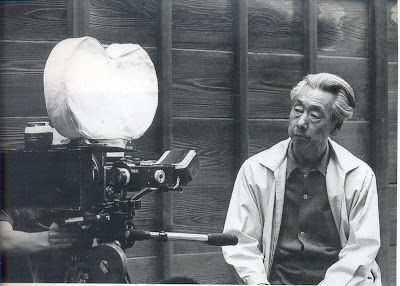Yasujiro Ozu
 (1903 - 1963)
(1903 - 1963)With his minimalistic (some would say Zen) style and cheerful, yet slow pace, Ozu was one of the first filmmakers to caught my attention back in my school days, when I didn't know anything about Japanese Cinema at all. I don't think his style is accademic as some detractors call it, neither I consider that he repeats the same film over and over. What is proper in a Ozu work (and what differs all of them) is to simplify life to the point that it transceds every daily aspect of our existence. Like Kijû Yoshida said about him, the Ozu aesthetic was only possible because when Ozu first filmed he saw through the camera a devastated, finite world. His work is the calm, gentle answer to that disastrous vision.
Be sure to see: Late Spring (1949), Tokyo Story (1953), An Autunm Afternoon (1962)
 (1905 - 1969)
(1905 - 1969)
Be sure to see: Late Spring (1949), Tokyo Story (1953), An Autunm Afternoon (1962)
Mikio Naruse
 (1905 - 1969)
(1905 - 1969)Although Mikio Naruse is like a forgotten gem of the golden age of Japanese Cinema, he is, in fact, one of the best directors Japan ever had. His discrete, silent style relfects his characters: brave women and weak men in troubled times. Often his films end in a hopeless open way."Like a great river with a calm surface and a raging current in its depths" (Akira Kurosawa) - Maybe the best way to describe his idiosyncratic style.
Be sure to see: Floating Clouds (1955), When a woman ascends the stairs (1960), Two in the Shadow (1967)
 (1932 - ...)
(1932 - ...)
 (1935 - 1983)
(1935 - 1983)
 (1947 - ...)
(1947 - ...)
Be sure to see: Floating Clouds (1955), When a woman ascends the stairs (1960), Two in the Shadow (1967)
Nagisa Oshima
 (1932 - ...)
(1932 - ...)Nagisa Oshima, or the director who banished green. Nagisa Oshima or the rebellious man, protector of freedom not only in cinematic practice but in life too. Finally, Nagisa Oshima the taboo breaker, the controversy film genius.
Be sure to see: Death by Hanging (1968), The Man who Left his Will on Film (1970), The Ceremony (1971)
Be sure to see: Death by Hanging (1968), The Man who Left his Will on Film (1970), The Ceremony (1971)
Kijû Yoshida
The greatest thing that happened in the past year was, without doubt, the French retrospective of Kijû Yoshida's work. It made me discover a thought-provoking body of work, in search of primordial definitons. Maybe one question is never answered completly (what is cinema? - THE question for Yoshida) but is in the search itself that all the excitment lies. Formally speaking, Yoshida is one of the best (just see Eros + Massacre, Heroic Purgatory or Coup D'État to see what I'am talking about!)
Be sure to see: Eros + Massacre (1969), Heroic Purgatory (1970) or Coup D'État (1973)
Be sure to see: Eros + Massacre (1969), Heroic Purgatory (1970) or Coup D'État (1973)
Shuji Terayama
 (1935 - 1983)
(1935 - 1983)A complete artist (without being a dilettante), Shuji Terayama exceedes all the norms of conventional art overcoming it by his own personal world, traumas, hopes. Being a poet first of all, his art (cinema, theater, writtings) bears the complications of poetic issues. His movies are deep, almost psychoanalitical and meta-cinematic, without being too theoretic Welcome to Shuji Terayama's mad world.
Be sure to see: Throw away your Books, rally in the streets (1971) Pastoral: To die In the Country (1973)
Be sure to see: Throw away your Books, rally in the streets (1971) Pastoral: To die In the Country (1973)
Takeshi Kitano
 (1947 - ...)
(1947 - ...)As some of us know, Takeshi Kitano is (was, for some people) the man. His personal way of filming and raising questions outside the realm of language, still amazes me. Sonatine keeps haunting me, and I don't know how that film was possible. He seems to me that it's from another world, but, nonetheless even that transcendence was filmed. How? I don't know. That's what amazes me about the early Kitano works. In spite of the change of tone in his last three films, I still think that Kitano is searching for another force, another transcendence that blasts the cinematic rules. One thing i'm sure of: he is the greatest japanese director working today.
Be sure to see: Sonatine (1993), Hana-bi (1997), Takeshis' (2005)
Be sure to see: Sonatine (1993), Hana-bi (1997), Takeshis' (2005)





Sem comentários:
Enviar um comentário